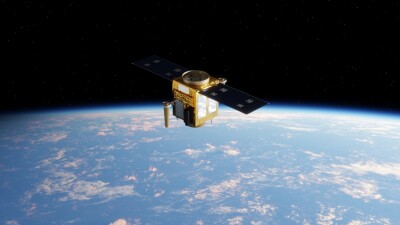Freiburg, Germany | December 9, 2024 - constellr, a European leader in thermal data services that enables smarter decisions for climate action, resource use, and global food security through actionable thermal intelligence powered by precise monitoring of Earth’s surface temperatures, announces the signing of a multi-year contract with the German Space Agency (Deutsches Zentrum für Luft- und Raumfahrt, DLR).
The agreement will see constellr provide the German Space Agency’s community in Earth Observation research with access to its high-resolution thermal data at 30-meter native resolution, for the first time. constellr is defining a new industry standard in thermal measurement by capturing refined temperature footprints of the Earth through precise pixel-level intelligence.
The data, which is provided by constellr’s state-of-the-art satellites, will enable researchers to analyse crop health, understand urban heat islands, and study climate change impacts with unprecedented clarity and detail. This will result in transformative research and applications across diverse fields, including food security, urban and infrastructure planning, and climate resilience.
The availability of such high-resolution data represents a meaningful improvement over the resolutions currently available, marking a significant advancement in satellite imaging technology. The German Space Agency’s decision to partner with constellr highlights the vital role of thermal imaging technology in solving national and global challenges. This partnership solidifies constellr’s position as a key innovator in the field, driving research and innovation across Germany and in the wider Earth Observation industry.
Dr. Max Gulde, CEO of constellr, said: "This anchor contract with the German Space Agency represents a major step forward in our mission to provide high-quality thermal data to the scientific community. The capabilities of our thermal imaging satellites will empower researchers across Germany to gain new insights and develop innovative solutions to some of the most urgent issues of our time from global food security to climate action and we are delighted to partner with DLR in this endeavor."
Godela Roßner, Head of Earth Observation at the German Space Agency at DLR, commented: "The German Space Agency is committed to strengthen Germany's role in global earth observation and space innovation. We are convinced that constellr’s data offer will fill a missing gap, that we still face today in understanding important elements of our earth system, e.g. vegetation growth and heat fluxes. In this context, we are very happy to partner with constellr and offer scientists and application developers in Germany through our data contract the opportunity to explore and demonstrate the potential of the data for new and innovative applications in various fields.."
About constellr
constellr is a European leader in thermal data services, creating a real-time global thermal intelligence atlas that enables precise monitoring of our planet’s surface temperatures, essential for understanding global climate dynamics and providing insights into water usage, and factors influencing the carbon cycle. Our actionable data supports the early detection of trends and anomalies across urban zones, infrastructure, the natural environment and agriculture, to enhance living standards, tackle climate change, and safeguard global food security. We deliver critical temperature insights that drive sustainable development and climate resilience by harnessing high-precision Land Surface Temperature (LST) measurements captured from space.
Founded in Freiburg, Germany, by a team of talented scientists and engineers, constellr launched its first thermal infrared sensor to the International Space Station in 2022. HiVE, the company’s fully commercial satellite network, is set to launch in 2025.
Source: Press Release






